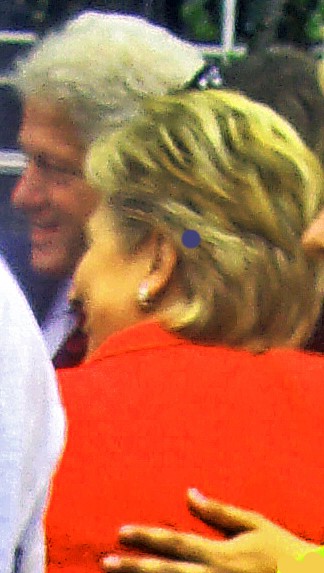PITTSBURGH — Campaigning for wife Hillary Clinton on Monday, the eve of this week’s crucial Pennsylvania primary, former president Bill Clinton left little doubt about his own positive read of her controversial ABC debate last week with rival Barack Obama. This was an affair that numerous critics blasted as little more than an orgy of “gotcha” questions — directed by co-hosts George Stephanopoulos and Charlie Gibson to Obama, for the most part.
The former president, however, boasted to a large crowd gathered in Pittsburgh’s Market Square downtown about “that one great debate where Hillary showed us she was ready to be president of the United States.”
Warming up the audience for the candidate herself, whose campaign plane had been delayed, prospective first husband Clinton recalled daughter Chelsea Clinton‘s recent affirmative answer to a questioner who asked whether she thought her mother would make a better president than her father had.
“I took a world of kidding,” Clinton said. “At first, I tried to make light of it, saying, ‘Did you ever see a family where the women didn’t stick together?’ … Then I gave a serious answer. I agreed with my daughter. I think she is the best candidate I have ever come across.” Had she not been yoked in service to his own political career for so long, “she’d have been here earlier,” the former president insisted.
Later, after candidate Clinton had arrived and addressed the crowd, the two of them worked opposite sections of the semicircular rope line.
The former president headed our way. Asked about his wife’s prospects in what was for her a must-win primary, he said, “I think she’s in pretty good shape out there. They like her here. They know she’s their girl.” But he declined to make predictions about numbers.
“I don’t know,” he said. “She’s been outspent 3 to 1. And, you know, they were dancing on her grave in Texas. She won anyway. And they never thought, after they outspent her 2 to 1 in Ohio, she could still win by 10 points. So we’ll see. She’s got a lot of good supporters here. It depends on a lot of things. It depends on how the undecided break. I literally don’t know. … That’s not my job. My job is to get her as many votes as I can.”
I asked Clinton about the weekend endorsement of his wife for this week’s primary by Richard Mellon Scaife, the conservative owner and publisher of the Pittsburgh Tribune-Review and the principal architect and paymaster (to the tune of several million dollars) of what Hillary Clinton once famously called a “vast right-wing conspiracy” to embarrass and bring down her husband.
“I’m surprised,” the former president answered, “but I take him at their word. I think they were impressed that she had the guts to go see ’em. And, you know, I generally find this, that people who demonize you, once they get to know you, they’re surprised you’re different than they imagined. And they like her. She made a lot of sense, and I take them at their word.”
He declined to speculate on whether his wife could expect an endorsement in the general election against Republican John McCain.
The Clintons’ visit was followed by one later Monday by Obama, who drew a massive crowd at an evening rally at the University of Pittsburgh, where the candidate was accompanied by his wife Michelle Obama, by Pennsylvania senator Bob Casey, who has endorsed Obama, and by Teresa Heinz Kerry, the widow of former Pennsylvania senator John Heinz who is currently married to Massachusetts senator, former presidential candidate, and Obama supporter John Kerry.
• Perhaps doing duty to the “equal time” concept, ABC’s Stephanopoulos followed up the Democratic debate by roughing up GOP candidate McCain during a Sunday interview on This Week.
Citing an article in that day’s Washington Post which depicted McCain as irascible and recounted several incidents of feuds with Senate colleagues, Stephanopoulos forced the Arizona senator on the defensive about his temperament.
For what it’s worth, one of McCain’s Republican colleagues in the Senate, Tennessee’s own Lamar Alexander, was asked, on the occasion of his recent visit to the Flyer, if he had ever been on the receiving end of one of McCain’s outbursts.
“Yes, I have,” the senator nodded gravely, going on to say, “There are very few of us who haven’t.”
 Jackson Baker
Jackson Baker

 Jackson Baker
Jackson Baker